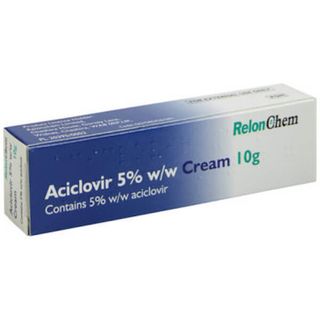
Cold Sores
Cold sores are those annoying, small, fluid-filled blisters that pop up around your lips or on your face. If you've ever had one, you know they can make you feel embarrassed, self-conscious, and like hiding away. Unfortunately, there’s no cure for cold sores, which are highly contagious and caused by the herpes simplex virus. so you might experience flare-ups throughout your life. But don’t worry – there are several treatments available that can help ease the uncomfortable symptoms, making living with cold sores much more manageable.
Cold Sores Treatments
- New product
 Aciclovir 5% Cream£16.967 reviews
Aciclovir 5% Cream£16.967 reviews - Out Of Stock
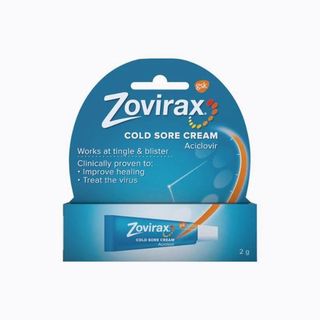
Zovirax Cold Sore Cream Tube 2g
Zovirax Cold Sore Cream Tube 2g - Out Of Stock
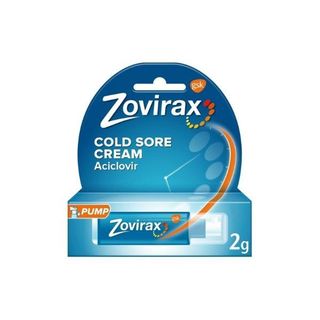
Zovirax Cold Sore Cream Pump 2g
Zovirax Cold Sore Cream Pump 2g - Out Of Stock
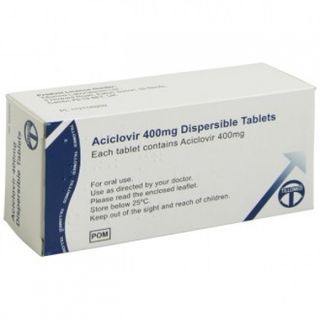
Aciclovir Tablets
Aciclovir 400mg Cold Sore Tablets - Out Of Stock
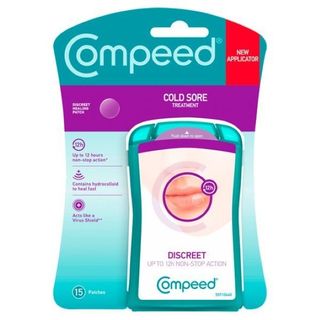
Compeed Cold Sore Patches
Compeed Cold Sore Patches
Start your assessment for Cold Sores
Don't wait to get the medical help you need.
Once you complete a short online assessment about your condition, you will be able to select your preferred treatment and quantity from a list of appropriate options for you.
Reviewed by our UK-based medical team
Takes less than 3 minutes to complete
Approved treatments dispatched same day (before 3pm)
Ordering as easy as 1, 2, 3
1. Find the ideal treatment
We can provide over 1099 leading medicines to treat over 94 conditions.
2. Get a free consultation
Our qualified healthcare professionals will assess your condition and needs.
3. Enjoy speedy delivery
And when the time comes to re-order, it'll only take a couple of clicks.
Advice for Cold Sores
What are Cold Sores and what causes them?
Most people are familiar with cold sores, the small blisters or scabs that develop on the lips. Cold sores are caused by the herpes simplex virus and occur after an outbreak when virus levels build up. Cold sores will often start in the ‘tingle’ phase where there is a tingling, itching or burning sensation in the area before a breakout where the blisters occur. The blisters or sores usually last for around 7 to 10 days and will clear up without treatment. If you start treatment at the tingle stage, you can sometimes prevent the outbreak from happening.
Cold sores are caused by one of the herpes simplex virus family known as HSV-1. In rare cases cold sores can be caused by HSV-2, however, this is normally due to having oral sex with a person who has genital herpes.
Cold sores are highly contagious and are passed on by direct contact, normally through kissing or sharing lipsticks or cutlery. Once you have HSV-1, it lies dormant in the nerves until an outbreak, normally caused by a trigger factor. Some people can get outbreaks every few months whereas others can go for years without a cold sore.
Cold sores occur when levels of the herpes simplex virus build up causing an outbreak of small blisters on the lips. The outbreak of cold sores is usually caused in response to trigger factors that can include:
- A low immune system (possibly due to another infection or illness)
- Fever or high temperature
- Stress or being upset
- Tiredness or fatigue
- Exposure to strong sunlight
- Injury to the mouth or lips
- Menstruation
Although an outbreak normally occurs in response to a trigger factor, cold sores can also occur randomly where there is no obvious trigger.
What are the signs and symptoms associated with Cold Sores?
When you are first infected with HSV-1, it is unlikely you will experience any symptoms during the primary infection and it may be some time before your first outbreak. Symptoms of the primary infection of herpes simplex can be more severe and may include:
- Sore throat
- Swollen glands
- Bad breath (halitosis)
- Painful sores in and around the mouth
After the primary infection, recurrent bouts of herpes simplex outbreaks will normally only cause cold sores without any of the symptoms described above. Cold sores normally follow a regular pattern:
- ‘Tingle’ Phase: a tingling, itching or burning sensation that acts as a sign that an outbreak is imminent in the area it is experienced.
- Outbreak: small, fluid-filled sores or blisters develop around the area where the ‘tingle’ phase occurred. The outbreak normally occurs 12 – 48 hours after the ‘tingle’ phase starts. Some of the cold sores may ooze or weep.
- Healing: the cold sores will stop oozing and start to scab over. They will slowly reduce in size and the irritation will ease. They will normally completely heal in 7 – 10 days.
Cold sores are contagious from the start of an outbreak until they have completely healed. They are most infectious during the outbreak when they have burst and are oozing.
How are Cold Sores diagnosed?
Cold sores can normally be self-diagnosed without the need to see your GP. You should check with your doctor if you experience any of the following:
- You have very frequent or multiple cold sores.
- Your cold sores last longer than 10 days or do not respond to treatment.
- You show any signs of a weakened immune system such as fever or malaise.
If your primary infection is severe you may wish to see your GP for treatment.
How do I treat Cold Sores?
Antiviral cream such as Aciclovir 5% cream is the first-line treatment for recurrent outbreaks of cold sores. If used correctly, they can speed up the healing time of cold sores or even prevent the breakout in some cases.
It is important when using cold sore treatment creams, like Aciclovir (Zovirax), that they are applied as soon as possible after the ‘tingle’ phase begins. This gives it the best chance of preventing the outbreak or speeding up the healing time. Once the cold sore has blistered or scabbed, antiviral cream will have less effect.
Antiviral cold sore creams prevent the herpes simplex virus from spreading and multiplying. It is normally applied five times daily for up to nine days. Cold sore treatments help to treat the current outbreak, however, they do not ‘cure’ the herpes simplex infection or prevent future cold sore outbreaks. Antiviral cold sore creams should not be used as a preventative measure to stop outbreaks when there are no signs of one occurring.
General tips for treating cold sores
- Ensure you stay hydrated by drinking plenty of fluids. This will stop your lips from becoming dry and cracked.
- Try to avoid acidic or salty foods, as this will irritate your cold sore further.
- Use an antiseptic mouthwash 2 – 3 times daily if brushing your teeth is too painful.
- When applying cold sore cream to the area, dab it on and let it soak in rather than rubbing it in.
- Avoid touching the cold sore and surrounding area wherever possible.
- If you do touch your cold sore, such as when you are applying cold sore cream, make sure you wash your hands thoroughly using soap and water.
- Don’t share your cold sore cream with others.
Can I prevent Cold Sores or breakouts?
How to minimise the spread of cold sores
You can’t completely remove the risk of becoming infected with cold sores however there are many steps you can take to reduce the risk of you catching HSV-1 or passing it on to others.
- Avoid touching the cold sore and surrounding area wherever possible.
- If you do touch your cold sore, such as when you are applying cold sore cream, make sure you wash your hands thoroughly using soap and water.
- Don’t share your cold sore cream with others.
- Do not share any other items that may have come into contact with your cold sore or the surrounding area, such as mugs, cutlery or lipsticks.
- Avoid kissing or having oral sex whilst you or your partner has a cold sore. Wait until it has completely healed so they are no longer contagious.
- Be especially careful around those who may have a low immune system such as young babies, pregnant women and those undergoing chemotherapy or who have HIV.
Preventing recurrent outbreaks of cold sores
Outbreaks of cold sores are normally caused by exposure to trigger factors that can be specific to the individual. Examples of the most common trigger factors for cold sores are given above in the ‘What are Cold Sores and what causes them?’ section. By avoiding the trigger factors for your cold sores you can reduce the frequency of cold sore outbreaks.
By applying antiviral cold sore creams, such as Aciclovir 5% cream, as early as possible into the ‘tingle’ phase, you can sometimes prevent breakouts from happening. There is no benefit to using cold sore creams continuously to prevent cold sores.
Alternatives
There are many non-prescription alternatives available for the treatment of cold sores such as;
Aciclovir (Zovirax) cream
This cream contains aciclovir as its active ingredient, an antiviral medication, to speed up healing by stopping the virus from multiplying.
Cymex
Cymex cream helps sooth the tingling sensation and moisturise the dry cracked lips. This can help prevent the infection from spreading.
Cold Sores FAQs
- Cold sores are caused by the herpes simplex virus and present as small blisters that are found on the lips and around the mouth.Left untreated, it will typically take between 7-10 days for a cold sore to clear up.
Cold sore outbreaks will usually begin with a mild tingling, itching or burning sensation felt around the mouth.
This initial sensation will then develop into small fluid-filled sores that usually form on the outer edges of the lower lip.
A sufferer who experiences recurrent frequent infections, often finds the cold sore developing in the same place each time. Initially, the sores can grow in size and start to ooze, before becoming crusty and scabbing over. This usually occurs within 48 hours of the initial tingle sensation.
The majority of cold sores will heal untreated within ten days, usually without scarring.
- Avoid becoming dehydrated by drinking plenty of fluids.
- Avoid foods that are salty or acidic, favoring soft, cool foods instead.
- Use an antiseptic mouthwash if you find brushing your teeth painful.
- It is recommended to apply cold sore creams with a gentle dabbing action, opposed to rubbing the cream in.
- It is important to wash hands using soap and water prior to and after the application of cold sore creams.
- It is advised to avoid touching the cold sores, apart from when applying the cream. Also, it is important not to share cold sore creams with others, due to cross-contamination of the infection.
Cold Sores are viral infections and can be treated using antiviral creams, such as Aciclovir or Penciclovir (Also known as Fenistil). If used correctly, these treatments can speed up the recovery time by up to 50%.
Cold Sore creams are readily available from pharmacies without a prescription. They are most effective when applied at the onset of an infection when the herpes virus is still reproducing and spreading. This is sometimes referred to as the tingling stage. After this initial period, antiviral creams are less likely to have a significant effect.
Cold sore creams are applied up to five times daily, for a period of four to five days. They do not eradicate the existing herpes simplex virus, nor can they prevent future outbreaks from occurring.
When treating cold sores, Antiviral tablets are generally considered more effective than their cream counterparts. However, they are only available on prescription and tend to be reserved for more severe cases.
Cold Sores can also be treated using a medicated patch, containing a gel called hydrocolloid. This form of treatment involves placing a patch over the cold sore, allowing it to heal whilst hiding the wound.
There are a range of non-antiviral creams that are available from pharmacies without a prescription. Though these creams are not specifically designed to treat the herpes simplex virus, they will instead help to ease the associated pain and irritation.
Painkillers such as Paracetamol and Ibuprofen (available in liquid form for young children) are also effective means for easing the associated pain of cold sores. Ask your pharmacist to recommend a tailored treatment suitable for you.
For the majority of cases, cold sore sufferers do not need to visit their doctor.
The condition is self-limiting and is generally treated with antiviral treatments that can be purchased over-the-counter.
- Yes, Cold Sores are contagious. The risk of spreading the infection to others can be minimized by following the advice below:
- Try to avoid touching the cold sores except when applying the appropriate cold sore treatment. If using a cream, ensure to dab it gently onto the sore to avoid damaging the skin further.
- Always wash hands prior to and after application of any cold sore cream, and any time after touching the infected area.
- Do not share cold sore medication with others. This can cause the infection to spread.
- Avoid sharing anything that has been in contact with the infected area. Items such as cutlery, drinking glasses or lip balms.
- Abstain from kissing and oral sex until the cold sores have completely healed.
- It is advised to be extra careful around vulnerable people whose immune systems may be weak or compromised. For example, newborn babies, pregnant women, the elderly.
- In many cases, there is no obvious trigger for a cold sore outbreak. However, factors that are thought to trigger a cold sore include:
- Suffering from an existing infection.
- Suffering from a fever or high temperature.
- Having an existing injury to the affected area.
- Menstruation (periods).
- Exposure to strong sunlight.
- Being tired or fatigued.
- Emotional or psychological stress.
- In some instances, cold sores can be caused by the Herpes Simplex Virus Type 2 (HSV-2). This can occur after having oral sex with a man or woman who suffers from genital herpes, which is a condition typically caused by HSV-2. Genital Herpes presents as painful blisters that develop on and around the genitals.
- If a sufferer is aware of the triggers that, for them, brings on a bout of cold sores, it is recommended they attempt to avoid these triggers. For example, a lip balm containing a sunblock may help prevent the recurrence of infection in someone for whom sunlight is a trigger. A sun-protection-factor of 15 or higher is advised.
- Cold sores can affect all ages. The vast majority of sufferers will experience their first infection during their childhood.
- Unfortunately, there is no known cure for cold sores. For most sufferers, the condition is endured as a short-lived nuisance that can be effectively managed through the use of non-prescription anti-viral treatments. These treatments are widely available in pharmacies and supermarkets. If a sufferer is experiencing severe of frequent episodes of cold sores, it is recommended they seek advice from their doctor.
Yes, it is possible to contract genital herpes from a cold sore.
If a person infected with a cold sore performs oral sex, he or she can transmit the infection to their partner. This can result in cold sores appearing on and around the genitals, which is called genital herpes.
The reverse of this is also possible. A facial cold sore can be caught from someone who has genital herpes through the act of oral sex.